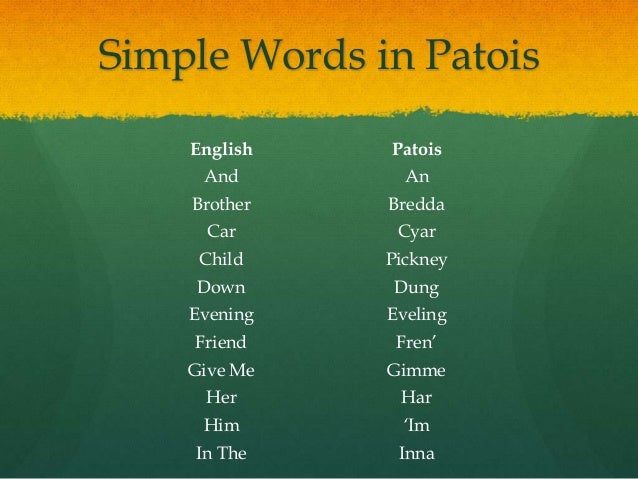


People tend to use British vocabulary, but there is also an obvious American influence on the lexicon, given the constant interaction with the United States of America mainly through mass media. Jamaican Standard English shares most of its lexicon with Standard English. Jamaican Standard English spelling is not very different from British spelling, and so there is not any feature worth mentioning. The dropping of the /r/ in words like ‘water’ (at the end of unstressed syllables) and in words like ‘market’ (before a consonant) but not in words like ‘car’ or ‘dare’ (stressed syllables at the end of the word).

The Standard English / ʒ/ of ‘ pleasure’ vs /dʒ/ of the Standard Jamaican English.The consonants in Jamaican Standard English are pronounced in the same way as in Standard English, with very few differences: The diphthong /au/ in Jamaican corresponds to / ə u/, as in the word ‘house’.The low English vowels /æ, ɑ, ɔ/ are different as in /hat / ‘hat, hot’.The mid central vowel of English, unstressed /ə/, becomes /a/ in Standard Jamaican English, for example: /bita/ for the word “bitter”.The high back vowels, the distinction between /u/ in “pool” and / ʊ/ in “pull” is maintained.The high front vowels /i/ and /I/ have a clear opposition in /si:t/ “seat” vs /sit / “sit”, this may depend more on vowel length than vowel quality.The short / a / sound, in words such as ‘man’ and ‘hat’, is very open, similar to its Irish realization.These are some of the main features of Jamaican Standard English in regards to the pronunciation of vowels: The pronunciation of Jamaican Standard English is resembles to some extent the Irish pronunciation, the Irish ‘accent’- in particular the accent of County Cork (in Ireland) -which influences Jamaican Standard English ‘accent’ today, probably because of a remnant reminiscence of former colonial ties to Ireland and to a lesser extent, America. The reason is not clear though, it could be because of the official status it has, or because of the status it was given in the past being the language of the settlers. 354).Īccording to Antje Bernstein (2006), unlike Jamaican Creole, Standard Jamaican English is considered to be prestigious. "In the Commonwealth West Indies standard American English is competing with southern British Received Pronunciation in influencing the emerging standard West Indian English and its regional varieties” (Holm, 1994. In addition to the British influence, SJE has been influenced by American English since the 1990s (Mair, 2002). For many in Jamaica, Standard Jamaican English (SJE) is associated with the Standard English of the educated British, as it bears resemblance to Received Pronunciation. However, it started to be established in the 21th century, because of the decolonization process, which began before independence and lasted long after it. Standard English has been present in Jamaica for a long time. It is not only the language of the government, the law and the media but also used for education and for almost all kinds of written communication (Sand, 1999, p. 293-294) Standard Jamaican English is the official language of Jamaica and used in all domains of public life. it is no longer accepted by the majority that the English of England, with RP as its accent, are the only possible models of English to be set before the young. In West Africa, in the West Indies, and in Pakistan and India. But the most important development of all is seen in the emergence of varieties that are identified with and are specific to particular countries from among the former British colonies. exists in an increasingly large number of different varieties. English is no longer the possession of the British, or even the British and the Americans, but. However, in the 1960s things have changed. They argue that the English used by educated people in Britain was the considered as the only model to use abroad. Halliday, McIntosh, and Strevens (1964) examined varieties of English in a number of decolonizing contexts.


 0 kommentar(er)
0 kommentar(er)
